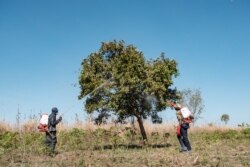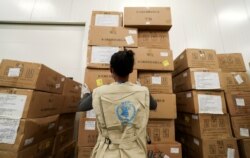Travel restrictions meant to slow down the coronavirus are hurting efforts to combat swarms of locusts that are ravaging crops in East Africa, posing a serious threat to regional food security.
A coalition of leading aid organizations will hold talks with emergency response and agriculture ministers from across the Horn of Africa on April 28 to discuss managing the dual threats.
Eight countries in East Africa — Djibouti, Eritrea, Ethiopia, Kenya, Somalia, South Sudan, Uganda and Tanzania — are dealing with locust infestations that are reducing crop yields. The current wave is of particular concern as locusts lay their eggs at the beginning of the rainy season. New swarms are expected to emerge just as the harvest begins in June and July.
Aid organizations are scrambling to make sure there is enough food in rural areas to cope with shortages, especially if the coronavirus reaches more rural areas and access becomes even more restricted.
Steven Burak, coordinator for the Regional Desert Locust Alliance and project manager for ACTED, a humanitarian aid group, spoke to VOA about this "perfect storm."
"In some countries where these policies or where these measures are starting to be taken on board, there have been limitations on humanitarian access," he said via a messaging app. "This is the perfect storm. What we're seeing as these long rains are starting over the coming months throughout the Horn of Africa, it's the ideal time to see an upsurge with desert locusts. Now, as this upsurge occurs you also have the harvests. So while the harvests are prepared, we'll see them be greatly affected by the number of locusts that will be swarming at that stage."
The U.N.'s Food and Agriculture Organization says more than 20.2 million people are already facing food insecurity in Ethiopia, Somalia, South Sudan, Uganda and Tanzania. That number could easily grow with fast-moving locust swarms capable of completely stripping an area's vegetation.
The FAO has 718,000 liters of chemical pesticides to control the spread of locusts. Air spraying and surveillance exercises are being carried out across 10 countries, using 26 airplanes.
John Shumlansky, country representative for Catholic Relief Services in Ethiopia, said via a messaging app that his organization was working to deliver food all over Ethiopia.
"We're trying to get two rounds of food out as quickly as possible. That's about 51,000 metric tons, feeding 1.74 million people," he said. "We're just not sure what's going to happen. There are restrictions. The government is allowing us to move stuff, to move our food and trucks, and to get people into areas for distributions.
"There aren't many [coronavirus] cases in rural areas, at least on record. But if that takes off, it could get really difficult for us. So we're in this mad rush now to get all this food delivered as quickly as possible," he added.
Many organizations working in areas infested by locusts say that even if the national government has given humanitarian groups the right to travel and deliver supplies, that message is simply not reaching local officials.
Next week's meeting will address those concerns and attempt to persuade ministers to make sure those operating in the field do not impede efforts to help the most vulnerable communities.


